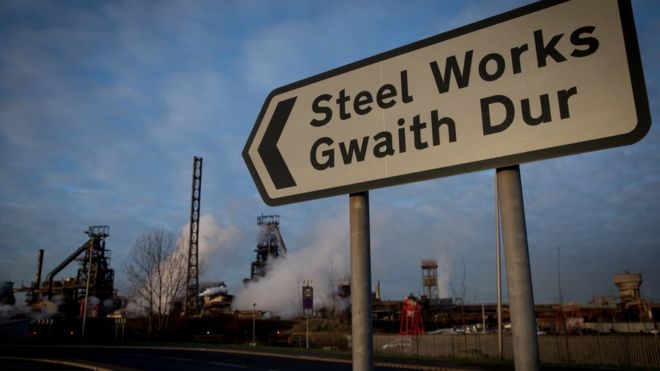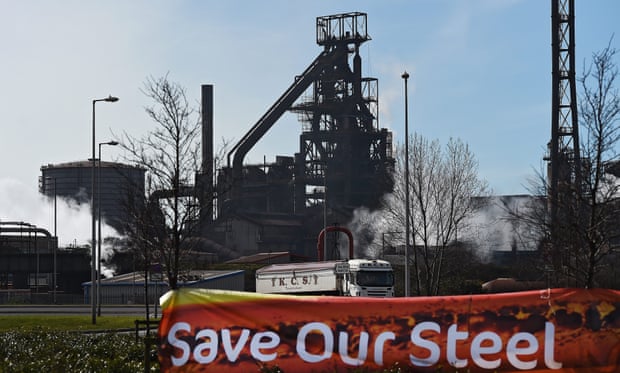Port Talbot in the South of Wales has long been known as the
home of one of the largest steelworks in the World and the biggest in Britain.
It employs more than 10% of the town’s own population into the steelworks
itself. It is also Tata Steel Europe’s biggest steelworks plant. Tata had
initially acquired the entire steel works business of Corus group in Britain in
2007 for £6.2
billion, at a time when Tata steel was quipped to become one of the most
successful steelworks in the World.
However, time has not been favourable to the Tatas as news
came this month of the group’s decision to sell off its entire UK steel
business. This sent out ripples of fear and pandemonium throughout the heavy
metals industry as well as the British Parliament over concerns for the number
of jobs that would be lost in the process of this sell off. The news came as a
devastating blow not only to the crawling steel business in Britain, but also
to British pride.
Tata had other sites in Scunthrope and Rotherham, but Port
Talbot has been the worst hit due to the sheer scale and history that the place
boasts of. The unwinding had started right at the time when the deal was made
as one of the biggest financial crises hit the entire world in the form of the
great recession of 2007-08. It was as if the deal couldn’t have come at a worse
time. The business never became profitable and in recent years, the losses and
debt continued to pile on and was affecting other businesses of the Tata group.
According to some estimates, Tata Steel remained under £13
billion in debt which was further expected to grow considering the ballooning
growth of low cost steel being dumped by China into the global markets. Tata
Steel had come to such a horrendous point where it is estimated to be losing
almost £1
million daily. The problems have been
visible for a couple of years now as the industry in Britain has constantly
been facing closures and job cuts. Port Talbot itself had witnessed around 1000
job cuts in the January of this year. Another plant owned by the Thai company
SSI had shut shop last year leading to a loss of around 1,700 British jobs.
The problem is not just limited to Britain; the entire
industry is going through a slow down, mainly thanks to China and the fall in
oil prices which have severely hit the use of steel in the petroleum and energy
industry. India, which is considered one
of the few glowing stars in a space of darkness, also has not been able to push
out steel congruent to the levels it had achieved prior to 2010. The slowdown
in the developing countries, mainly led by China has prompted them to offload
their excessive supply on the global markets leading to crashing of prices. The
developed world cannot bear the brunt of this excessive supply as their output
neither has been nor can hope to be as cost friendly as that of the developing
economies.
This is because of several factors, but mainly the cost of
production and energy charges which steelmakers in the developed economies have
to deal with. Countries like the UK and USA have high labour costs and even
higher energy costs which leads to a significantly higher cost of production
than their competitors on the other side of the World map. Also, the added
costs of taxes and carbon pricing put European makers at a severe disadvantage
over countries like Russia, China, India, Ukraine, etc.
Amid this crisis, one thing is sure; Tata is heading out and
the British lawmakers have their work cut out for them ahead of the impending
loss of close to 4,000 jobs from the Port Talbot business itself. There have
been calls for building up of tariffs against cheap import of steel, or for
nationalizing the entire steel business at a huge cost to the taxpayer. As of
now, a few deals have come to the fore, including a recent one involving a
straight out management buyout, led by the company’s Managing Director, Stuart
Wilkie who has propped a rather outlandish plan where each worker is expected to
invest £10,000
to enable a takeover from the Tata group. Another one involves Indian origin
Sanveev Gupta’s Liberty House which offered to buy out the business with the
support of the British government and in exchange for a number of sweetheart
deals.
Analysts and experts suggest that demand for unspecialized
steel will continue to fall as other businesses which depend on the metal, cut
their demand in favour of alternative materials. This makes it imperative for
the entire industry to undergo long pending structural changes, mainly
revolving around cutting down costs and managing optimum capacity. However,
there is little doubt that even after these consolidation measures, some jobs
are bound to be lost. The industry will have to restructure and shift to small
scale efficiency units in place of bigger and costlier ones. What becomes of
the Port Talbot steel works can only be known as things play out in the span of
the coming months.






